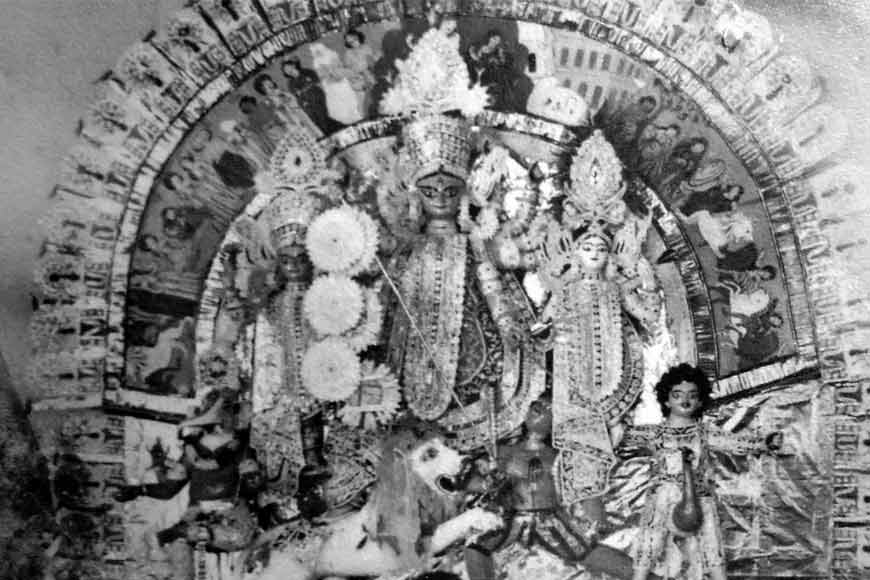The Englishman who started Durga Puja in Surul to succeed in business!

Epicurus’ paradoxical attitude towards religious observances is fascinating. Although he dismissed most of the popular notions about gods and their involvement in human affairs, he still encouraged his followers to participate in the traditional cults of their countries. He believed that, by engaging in popular religious activities, they would strengthen their own mental conception of the gods and thereby be better able to imitate and experience the divine blessedness.
We do not know if John Chip was a follower of Epicurus, but he did initiate Durga Puja at his home in Surul when he faced recession in his business ventures. He was not only a devout follower of Goddess Durga but during the annual autumn festival, he fasted during puja and followed every ritual with utmost sincerity. Now, who was John Chip? Not much is known about this enterprising gentleman who arrived in Bengal in the late-18th century.
Chip lived in Surul at the fag end of the 18th century. Locals mispronounced his name and he came to be known as ‘Chikbahadur.’ Chip had joined the East India Company and migrated to India when he was barely 16-year-old. Once he stepped on Indian soil, he joined the company as a writer, or in other words, a junior clerk.
During this time, the southwest part of Birbhum district, on the banks of the now-arid Mayurakshi River, was fallow and unsuitable for cultivation. Vast tracts of land lay there without vegetation or human settlements. When the East India Company was granted permission to carry out business in the country, the officials discovered this area and decided to develop the region as a profitable business hub. In 1873, the East India Company appointed Edward Hay to initiate and develop sericulture in the region. Later, the company dispatched Mr Frusard to oversee the entire operation. But the volatile and unpredictable nature of Mayurakshi that often flooded the area during monsoons was a major impediment for setting up a business. Frusard was frustrated and gave up. After him, John Chip acquired the business in lieu of paying Rs 3,415 as annual revenue to East India Company and he invested in sericulture and manufacturing of silk textile. But prior to that Chip was posted in Surul. He is considered a pioneer in spearheading indigo and lac business in Birbhum. John Chip succeeded in his venture and sericulture flourished in Gunutia, a village close to Surul.
Viswa Bharati, the world-renowned varsity at Santiniketan lies close to Surul village. Chip lived in Surul at the fag end of the 18th century. Locals mispronounced his name and he came to be known as ‘Chikbahadur.’ Chip had joined the East India Company and migrated to India when he was barely 16-year-old. Once he stepped on Indian soil, he joined the company as a writer, or in other words, a junior clerk. The intelligent and enterprising youth soon started working as an agent for the company and started trading in cotton, silk, and lacquer. He decided to settle down at Birbhum and built his ‘Kuthi’ (house and factory) for the purpose.
At one point, all the business ventures that Chip owned went into recession. Nothing seemed to work in his favor. He had a large contingent of local employees who worked under him. One of them, Dewan Shyamkishore Singh, finally came up with an idea. He suggested offering prayers to Durgatinashini Durga (Durga is Durgatinashini which means 'the one who eliminates suffering'. Her name thus indicates her role as the one who protects her devotees and removes evil from the world) might reverse the situation. Chip was willing to do anything to save his business from drowning and he agreed to follow the suggestion. Durga Puja was organized at his Kuthi and he followed all rituals piously, including fasting and offering ‘Anjali’ to the deity. Coincidentally, a reversal of fortune followed and the very next year, Chip’s profits doubled. Chip was convinced that the Goddess had helped him revive his ventures. He ordered his staff to continue the tradition and organize Durga Puja in his Kuthi annually.
John Chip acquired the business in lieu of paying Rs 3,415 as annual revenue to East India Company and he invested in sericulture and manufacturing of silk textile. But prior to that Chip was posted in Surul.
From records, it is known that the total cost of this annual Puja came to approximately Rs 50, of which Rs 17 was spent on arranging the puja, which included the idols, priests etc. He gifted new clothes to all the villagers on the occasion of Puja. On the day of ‘Ashtami’, villagers were invited to participate in the community lunch funded by Chip. This tradition continued till Chip was alive and not even for once was the ritual interrupted.











